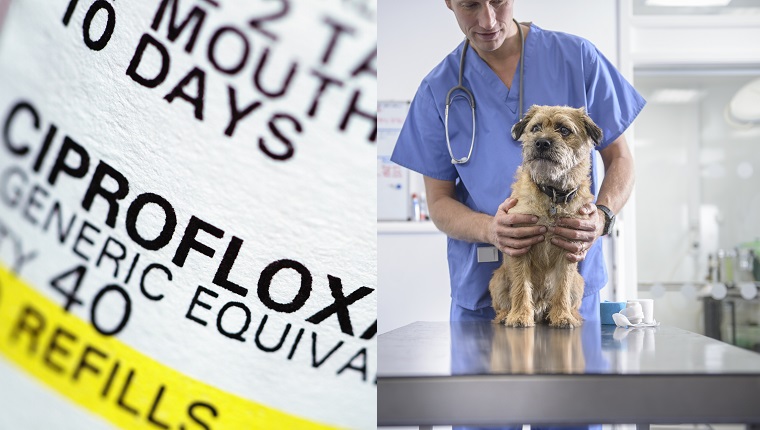Ciprofloxacin, also known by the brand name Cipro, is an antibiotic that can treat dogs who suffer from urinary tract infections, skin infections, respiratory infections, and other bacterial infections.
Ciprofloxacin is a broad spectrum antibiotic, meaning it can attack multiple types of bacteria. Because of this, vets usually only prescribe it if other specific antibiotics for dogs fail, as long-term exposure to ciprofloxacin can result in bacteria adapting and growing more resilient.
The FDA has not approved the drug for use in animals, but a veterinarian can safely prescribe it. Follow all of your vet’s instructions carefully if they prescribe ciprofloxacin to treat your dog. You can easily order ciprofloxacin for your dog online from Chewy’s pharmacy with your vet’s prescription.
Here’s what you should know about the uses, dosage, and side effects of ciprofloxacin for dogs.
Uses Of Ciprofloxacin For Dogs

Ciprofloxacin is used to treat bacterial infections in dogs. Vets usually only prescribe it when other antibiotics fail in order to avoid bacteria developing resistance to treatment.
It’s most commonly used to treat urinary tract infections, skin infections, and respiratory infections, though it can also be used to treat stomach infections or infections in other places in the body. Certain forms of ciprofloxacin can be used for ear infections or eye infections.
The drug works by disrupting the bacteria’s enzymes from being able to read or uncoil strands of DNA. This kills the bacteria in a fairly short time, but you must continue to give the medication to your dog on time for the full regimen that your veterinarian prescribes.
Dosage Of Ciprofloxacin For Dogs

The following is a guideline for typical use of the drug in dogs and must not replace your vet’s advice for your individual pet.
The usual dosage of ciprofloxacin for dogs can range from 5 to 15 mg per kilogram of the dog’s body weight, or 2.27 to 6.8 mg per pound, given once every twelve hours.
Your veterinarian will give you the exact dosage and instruct you on how to measure it. Dogs should take the medication orally, and it’s most effective if they take it on an empty stomach.
You should allow your dog to drink as much fresh water as they need, and make sure it’s always available.
The symptoms of the infection may start to improve quickly, but that doesn’t mean the infection has been successfully treated. You need to keep up the regimen until your veterinarian tells you it’s okay to stop.
Side Effects Of Ciprofloxacin For Dogs

There are several side effects that your dog may experience with use of ciprofloxacin. Most side effects are rare, and the risk increases with long term use.
Here are a few common side effects that you may see in dogs who take ciprofloxacin:
- Vomiting
- Loss of appetite
- Diarrhea
- Joint stiffness
- Muscle pain
- Impaired vision, cataracts if given long term
Other, more serious side effects can occur, such as convulsions, seizures, confusion, bloody diarrhea, or fever. If you see these symptoms in your dog, you should seek veterinary care immediately.
In rare cases, the drug can cause damage to the gastrointestinal tract. As with all medication, there is a risk of rare allergic reaction that can result in anaphylaxis.
Veterinarians should adjust ciprofloxacin dosages for dogs with central nervous system damage, liver disease, or kidney disease. Dogs who are pregnant or puppies under 28 weeks of age should not take ciprofloxacin at all.
Inform your vet of any other medication your dog is taking, as these can interact badly with ciprofloxacin and harm your dog.
Has your dog ever taken ciprofloxacin for a medical condition? Did you see any side effects? Let us know in the comments below!









